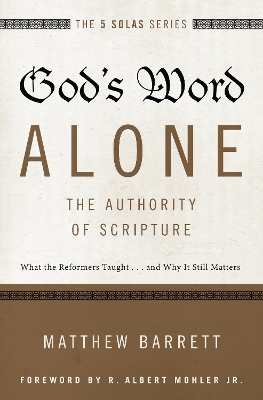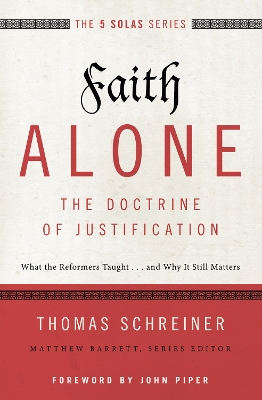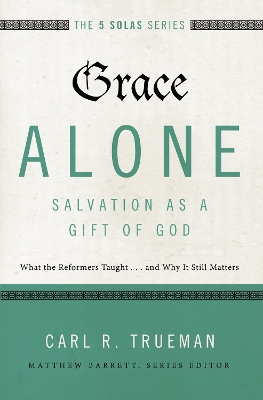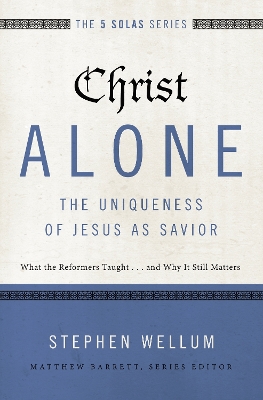The Five Solas
5 total works
Scholar and pastor Matthew Barrett retraces the historical and biblical roots of the doctrine that Scripture alone is the final and decisive authority for God's people. God's Word Alone is a decisive defense of the Bible as the inspired and inerrant Word of God.
Revitalizing one of the five...
Read moreScholar and pastor Matthew Barrett retraces the historical and biblical roots of the doctrine that Scripture alone is the final and decisive authority for God's people. God's Word Alone is a decisive defense of the Bible as the inspired and inerrant Word of God.
Revitalizing one of the five great declarations of the Reformation—sola Scriptura—Barrett:
- Analyzes what the idea of sola Scriptura is and what it entails, clarifying why the doctrine is truth and why it's so essential to Christianity.
- Surveys the development of this theme in the Reformation and traces the crisis that followed resulting in a shift away from the authority of Scripture.
- Shows that we need to recover a robust doctrine of Scripture's authority in the face of today's challenges and why a solid doctrinal foundation built on God's Word is the best hope for the future of the church.
This book is an exploration of the past in order to better understand our present and the importance of reviving this indispensable doctrine for the Christian faith and church today.
—THE FIVE SOLAS—
Historians and theologians have long recognized that at the heart of the sixteenth-century Protestant Reformation were five declarations, often referred to as the "solas." These five statements summarize much of what the Reformation was about, and they distinguish Protestantism from other expressions of the Christian faith: that they place ultimate and final authority in the Scriptures, acknowledge the work of Christ alone as sufficient for redemption, recognize that salvation is by grace alone through faith alone, and seek to do all things for God’s glory.
The Five Solas Series is more than a simple rehashing of these statements, but instead expounds upon the biblical reasoning behind them, leading to a more profound theological vision of our lives and callings as Christians and churches.
The Five Solas Series Pack
by Thomas R. Schreiner, David VanDrunen, Matthew Barrett, Stephen Wellum, and Carl R. Trueman
Discover the truths of the Reformation in this special pack, which includes all five books in the Five Solas Series: Christ Alone (Stephen Wellum), Faith Alone (Thomas Schreiner), God's Glory Alone (David VanDrunen, God's Word Alone (Mathew Barrett), Grace Alone (Carl Trueman).
Historians and theologians alike have long recognized that at the heart of...
Read moreDiscover the truths of the Reformation in this special pack, which includes all five books in the Five Solas Series: Christ Alone (Stephen Wellum), Faith Alone (Thomas Schreiner), God's Glory Alone (David VanDrunen, God's Word Alone (Mathew Barrett), Grace Alone (Carl Trueman).
Historians and theologians alike have long recognized that at the heart of the sixteenth-century Protestant Reformation were five declarations (or “solas”) that distinguished the movement from other expressions of the Christian faith.
Five hundred years later, we live in a different time with fresh challenges to our faith. Yet these rallying cries of the Reformation continue to speak to us, addressing a wide range of contemporary issues. The Five Solas series will help you understand the historical and biblical context of the five solas and how to live out the relevance of Reformation theology today.
Historians and theologians have long recognized that at the heart of the sixteenth-century Protestant Reformation were five declarations, often referred to as the ‘solas’: sola scriptura, solus Christus, sola gratia, sola fide, and soli Deo gloria. These five statements summarize much of what the Reformation was about, and they...
Read moreHistorians and theologians have long recognized that at the heart of the sixteenth-century Protestant Reformation were five declarations, often referred to as the ‘solas’: sola scriptura, solus Christus, sola gratia, sola fide, and soli Deo gloria. These five statements summarize much of what the Reformation was about, and they distinguish Protestantism from other expressions of the Christian faith. Protestants place ultimate and final authority in the Scriptures, acknowledge the work of Christ alone as sufficient for redemption, recognize that salvation is by grace alone through faith alone, and seek to do all things for God’s glory.
In Faith Alone—The Doctrine of Justification renowned biblical scholar Thomas Schreiner looks at the historical and biblical roots of the doctrine of justification. He summarizes the history of the doctrine, looking at the early church and the writings of several of the Reformers. Then, he turns his attention to the Scriptures and walks readers through an examination of the key texts in the Old and New Testament. He discusses whether justification is transformative or forensic and introduces readers to some of the contemporary challenges to the Reformation teaching of sola fide, with particular attention to the new perspective on Paul.
Five hundred years after the Reformation, the doctrine of justification by faith alone still needs to be understood and proclaimed. In Faith Alone you will learn how the rallying cry of “sola fide” is rooted in the Scriptures and how to apply this sola in a fresh way in light of many contemporary challenges.
Grace is the heart of the Christian gospel. It's a doctrine that touches the very depths of human existence and makes Christianity such an essential alternative to the dissolution and nihilism of modern culture. Grace Alone guides you into a better doctrinal understanding of the issue and gives you...
Read moreGrace is the heart of the Christian gospel. It's a doctrine that touches the very depths of human existence and makes Christianity such an essential alternative to the dissolution and nihilism of modern culture. Grace Alone guides you into a better doctrinal understanding of the issue and gives you a more glorious vision of an active and saving God.
The language of grace fills the Bible so much that to say "grace alone" may not evoke much reflection. Unlike "faith alone," there's no theological controversy among expressions of Christianity. Reviving one of the five great declarations of the Reformation (and one of the more overlooked)—sola Gratia—professor and church historian Carl Trueman:
- Provides a thorough definition of grace as it's found in the Bible and an overview of biblical references to, and teaching on, grace.
- Tracks the doctrine of grace as it's been articulated throughout church history, with discussions of Augustine, Pelagius, Thomas Aquinas, and ending with the Reformation and theologies of Luther and Calvin.
- Looks at the relationship between the means of grace and the modern church, defining the practical implications of the Reformation's understanding of grace.
Explanations throughout on the relationship of grace to sin, salvation and glorification, God's sovereignty, the sacraments, and the controversies regarding freewill and predestination. Grace Alone is a beautiful and much-needed revival of this foundational doctrine and the assurance of salvation.
—THE FIVE SOLAS—
Historians and theologians have long recognized that at the heart of the sixteenth-century Protestant Reformation were five declarations, often referred to as the "solas." These five statements summarize much of what the Reformation was about, and they distinguish Protestantism from other expressions of the Christian faith: that they place ultimate and final authority in the Scriptures, acknowledge the work of Christ alone as sufficient for redemption, recognize that salvation is by grace alone through faith alone, and seek to do all things for God’s glory.
The Five Solas Series is more than a simple rehashing of these statements, but instead expounds upon the biblical reasoning behind them, leading to a more profound theological vision of our lives and callings as Christians and churches.
Professor of theology Stephen Wellum considers Christ's singular uniqueness and significance biblically, historically, and today, in our pluralistic and postmodern age. Christ Alone is a much-needed study and defense of the doctrine that provides coherency to the Christian faith.
If the church is to proclaim the same Christ as...
Read moreProfessor of theology Stephen Wellum considers Christ's singular uniqueness and significance biblically, historically, and today, in our pluralistic and postmodern age. Christ Alone is a much-needed study and defense of the doctrine that provides coherency to the Christian faith.
If the church is to proclaim the same Christ as the Reformers, we must understand and embrace solos Christus with the same clarity, conviction, urgency, and abundance of joy as the Reformers. To that end, Wellum:
- Recovers the Reformers' basic insights by focusing first on two teachings: the exclusive identity of Christ and his sufficient work.
- Follows the historical roots of the doctrine and its developments to show how the uniqueness of Christ has come under specific attack today.
- Retraces the storyline of Scripture, from Christ's unique identity and work as prophet, priest, and king, to the application of his work to believers and our covenantal union with him.
Christ Alone seeks to recover a robust biblical and theological doctrine of Christ's person and work—and a renewed understanding that apart from Christ there is no salvation—in the face of today's challenges, unpacking why a fresh appraisal of the Reformation understanding of Christ alone is so important today.
—THE FIVE SOLAS—
Historians and theologians have long recognized that at the heart of the sixteenth-century Protestant Reformation were five declarations, often referred to as the "solas." These five statements summarize much of what the Reformation was about, and they distinguish Protestantism from other expressions of the Christian faith: that they place ultimate and final authority in the Scriptures, acknowledge the work of Christ alone as sufficient for redemption, recognize that salvation is by grace alone through faith alone, and seek to do all things for God’s glory.
The Five Solas Series is more than a simple rehashing of these statements, but instead expounds upon the biblical reasoning behind them, leading to a more profound theological vision of our lives and callings as Christians and churches.





